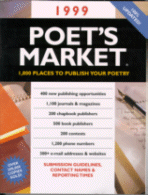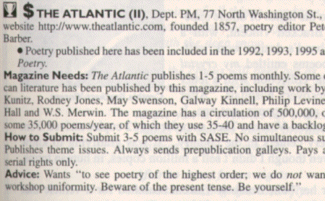Talking Poetry With Chantelle Bentley
by Claire E. White
For any poet hoping to see his or her poems in print,

|
Where did you grow up?
I was born in Ft. Thomas, Kentucky and grew up in the suburbs of Cincinnati, Ohio.
How did you first become interested in poetry?
As I think often happens, I began writing poetry during my teen years as a way to work through mixed up emotions and events I had no control over (i.e., divorce, stepparents, moving and changing schools, etc.).
What did you like to read as a child?
During my early childhood I read a lot of fairy tales, but as I became a better reader I really enjoyed reading Madeline L'Engle (A Wrinkle in Time, A Wind in the Door, The Swiftly Tilting Planet). My grandmother gave me one of my all time favorite books when I was about eleven years old, Jonathan Livingston Seagull by Richard Bach. I won't say I completely understood the book at that age, but I really enjoyed the story.
How did you get your start as an editor?
I sort of took a non-traditional route to becoming an editor. I began at F&W Publications in 1989 as an Accounts Receivable Clerk. From there I went to work in the Typesetting department as a proofreader. Then in 1994, after taking 15 months off following the birth of my daughter, I joined the Market Books Department as production editor of both Poet's Market and Novel & Short Story Writer's Market.
How did you come to be the editor of The Poet's Market?
After having worked on three editions of Poet's Market as production editor, I took over as editor when Christine Martin, the editor at the time, left to have her first child. And I must admit those were big shoes to fill, Christine was extremely meticulous with Poet's Market. I was more than a little nervous about keeping up with her standards.
I'd like to talk about the newest edition of the Poet's Market for 1999. What's new in this year's edition?
 |
The Poet's Market contains over 1,800 markets looking for poetry. How do you select which markets to list in the book?
The system for selection is pretty loose. I try to get in as many markets from which I receive questionnaires. (We mail questionnaires to poetry markets we learned about. The questionnaires request information about their poetry needs, submission guidelines, frequency of publication, acceptance/rejection rates, pay rates, advice, etc.) Basically, my goal is to provide poets with as wide a selection of poetry markets as I can fit within the book's 600 pages. The two things which may keep me from including a magazine or press market in Poet's Market is a large reading fee or a high percentage of subsidy published books. We try to go by the guideline that because poets are rarely paid for their work, we prefer they not have to pay (or pay much) to see their work in print.
What is the most challenging aspect of editing the Poet's Market?
Meeting the printer deadline. Poet's Market takes 10 months to compile and involves a lot of little parts--researching the poetry field, surveying readers; finding new markets; updating existing markets; scheduling, interviewing, writing and/or editing the Insider Report interviews; editing and proofing copy; creating indexes; and, probably, 20 to 30 other steps that need to be completed along the way.
Do you have any favorite poetry styles or genres?
I do not have one favorite poetry style or genre. I read a lot of poetry throughout the year in the various journals listed in Poet's Market. And in each of those journals, I almost always find at least a poem or two that I like. Having said that, however, I do tend to be more attracted to free verse with a lot of imagery. I also tend to connect more quickly with poems about relationships or the interactions between people than I do, say, nature poems.
Who are some of your favorite poets?
I'm fickle. I like whoever I am currently reading. Although, Margaret Atwood is one of my favorite authors who I still haven't found the nerve to ask for an interview.
How has the Internet affected the poetry marketplace?
I think the Internet has, more than anything, increased the marketplace for poets. It has provided a number of poets and editors an inexpensive way to get their poetry and the poetry of others out into the community. However, I am not sure it has made publishing poetry any easier. It is just another format for getting your work seen by others. Unfortunately, locating online magazines that publish the type of poetry you write takes almost as much work as locating print journals. The benefit of the Internet is that you don't have to pay to see a sample. The hardest task a poet has, besides writing the poem, is finding the right market for their poetry. Diligence is the key to being published whether on the Internet or in print. Also, from my experience, a good portion of Poet's Market readers are not connected to the Internet at home where they can easily search for potential markets.
Besides the Internet, have you noticed in other changes or trends in the marketplace over the last few years?
| "I think the Internet has, more than anything, increased the marketplace for poets. It has provided a number of poets and editors an inexpensive way to get their poetry and the poetry of others out into the community." |
What are some common mistakes people make when submitting poems to editors?
Not following submission guidelines, submitting poetry during a time when the journal is closed to submissions, not familiarizing themselves with the style of poetry a journal publishes and submitting poetry that is all wrong for a particular publication, and not sending a SASE for reply.
Should poets send a cover letter with their poetry submissions?
It depends on the market. If an editor says that he or she would like to receive a cover letter than, by all means, send one. However, some editors don't care and most editors say a cover letter, or the lack of one, will not keep them from accepting good work. The thing to do is follow the journal's guidelines and, then, send a professional, courtesy cover letter just like you would in any other business transaction. Some editors prefer cover letters to be more "friendly" to help them to get to know the poet. But, usually, if an editor wants that type of cover letter, he or she will tell you in their guidelines.
What are some good ways for beginning poets to get their work noticed?
Send your best work, not your first draft of a poem. Make sure the poem suits the needs of the publication or press. Also, care enough about your work to send a neat, error-free manuscript with a cover letter that shows you know about the journal or press to which you are submitting. Poetry editors are not as concerned with who the poet is or where they have been published before, unless you're trying to publish a collection, as they are with the quality of the work and whether or not it fits in with their publication's theme or focus.
What is a chapbook?
A chapbook is a small collection of poetry, usually 40 to 80 pages in length. Chapbooks are much less expensive to produce than full-length collections.
Is publishing a chapbook something a serious poet should consider?
Yes, definitely. Many poets who have gone on to publish full-length collections began by publishing chapbooks. In fact, many small presses are more willing to publish a chapbook by a lesser known poet because they don't require as much money upfront and, therefore, don't need to make as much money in return. Also, chapbooks are great to hand out at readings to help poets develop name recognition within the poetry community.
How important are poetry contests? Should poets be willing to pay entry fees?
| "The hardest task a poet has, besides writing the poem, is finding the right market for their poetry. Diligence is the key to being published whether on the Internet or in print." |
Is there a lot of turnover in the poetry markets?
Turnover in editors or in magazines from year to year? From my experience with the listings in Poet's Market each year, there are always magazines and presses that either go out of business or stop accepting poetry submissions just as there are always new magazines being published. However, the bulk of Poet's Market's listings have been publishing for years and show no signs of stopping.
When you're not reading and editing for work, what do you like to read in your spare time?
I am currently in school at Xavier University so a lot of my spare time is spent reading textbooks. However, in the few minutes I have to read before I fall asleep, I fluctuate between reading contemporary fiction (most recently Father Melancholy's Daughter by Gail Godwin) and books about needlework (I am avid embroiderer.) I also try to squeeze in a C.S. Lewis book every few months. And, invariably, a poetry collection will fall into my lap at work that I just can't resist, and so, at some point, I will carry it home to read.
Return to the January 1999 issue of The IWJ.
More from Writers Write
